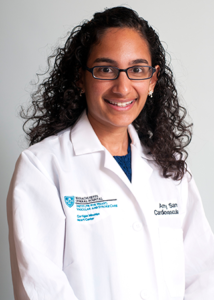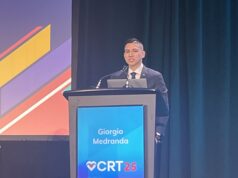
The Women in Cardiology (WIC) section of the American College of Cardiology (ACC) report that 47% of female cardiologists have avoided being pregnant during periods when they would be exposed to radiation, but 57% have been exposed to radiation while pregnant. Furthermore, only 20% used foetal radiation badges and only 24% used additional lead when exposed to radiation during pregnancy.
Amy Sarma (Department of Cardiology, Massachusetts General Hospital, Boston, USA) and others state, in the Journal of the American College of Cardiology, a survey has indicated that only 21% of general cardiology fellows are female and this figure drops to 8% for interventional cardiology fellows. They add that another survey suggested that female cardiologists are less likely than their male counterparts to be married or to have children and have differential childcare roles (ie. more likely to be the main caregiver). “However, the experience of pregnancy among cardiologists has never been investigated, although it is speculated that concerns surrounding pregnancy may deter women from choosing a career in cardiology”. Therefore, they sought to determine the “impact of a career in cardiology on the issues of family planning to better understand the current experience and inform strategies for reform”.
Of 501 women who responded to the survey (sent to 5,005 female members of the ACC), 76% had experienced at least one pregnancy and 45% of the remaining 24% who had never been pregnant hoped to be so in the future. Sarma et al comment that most pregnancies occurred during cardiology fellowship (49%) or early career (63%), adding: “Thus, women are concurrently trying to establish their careers while growing their families, leading to rational interplay between family planning and career factors.” Furthermore, they add that 43% of women were asked about their intention to have children during interviews—a figure that does not appear to have changed over time as there was no significant difference between older and younger women who were asked this question (45% for women older than 50 years vs. 43% for women aged younger than 50; p=0.67). “The prevalence of this question raises important questions as to why interviews so commonly inquire about family planning and whether it influences women’s choices regarding positions,” the authors write.
According to Sarma et al, a previous survey found that concern about radiation exposure is a more of a barrier to pursuing a career in interventional cardiology for women than it is for men. In their survey, they found that nearly half of all respondents (47%) tried to avoid being pregnant during periods when they would be exposed to radiation. Additionally, respondents younger than 50 years of age were more likely to have avoided pregnancy during periods of radiation exposure than those older than 50 years (50% vs. 39%; p=0.03). The authors speculate that this finding “suggests younger cardiologists are more concerned about radiation”.
However despite these concerns about radiation exposure, 34% of respondents did not know if their department had an official policy on radiation exposure during pregnancy and 32% reported that their department did not have such a policy—with only 34% reporting their department did have a policy. Furthermore of the 57% of respondents who reported being exposed to radiation during pregnancy, only 20% used foetal radiation badges, 24% used additional lead, and 42% increased their distance from sources of radiation. Sarma et al comment that this suggests “pregnant woman are not uniformly using means of reducing monitoring or reducing radiation exposure”. They add: “Barriers to these monitoring and radiation reduction strategies remain unknown; it is not clear whether women or their workplaces are unaware of such strategies or whether women do not feel empowered to implement them.”
Other findings in the survey indicate that women feel under pressure to take shorter maternity leave than that available to them (although younger women took longer leave, indicating a culture change), experience barriers to breastfeeding (only 32% reported that there were no barriers), and that their career influenced their childbearing decisions (58% of women who chose not to have children cited their career as the reason). “Policies that normalise parental leave and promote the health of pregnant women and the developing foetus may improve the ability of all cardiologists to better balance growing their families with their developing careers and, in particular, may attract more women to the field,” Sarma et al conclude.
Sarma told Cardiovascular News: “The recommendations that we put forth in our paper are based on the recommendations from the Society for Cardiac Angiography and Interventions (SCAI) consensus document on pregnancy and radiation. While we do not know the underlying reasons behind the under use of foetal monitoring and reduction strategies revealed in our survey, we recommend that all employees receive training on the available data regarding foetal radiation exposure, means of monitoring and reducing exposure, and the contact information for a radiation safety officer with whom they can discuss concerns, potentially at the time of fluoroscopy training. Women contemplating pregnancy could consider wearing a dosimeter under lead in order to determine prior to pregnancy how much radiation their practice activities could result in. Finally, we encourage workplaces to make available and promote the use of lead of appropriate thickness and fit during pregnancy, foetal dosimeters with prompt feedback, and that when possible, women be afforded the opportunity to alter their practice activities during pregnancy.”













